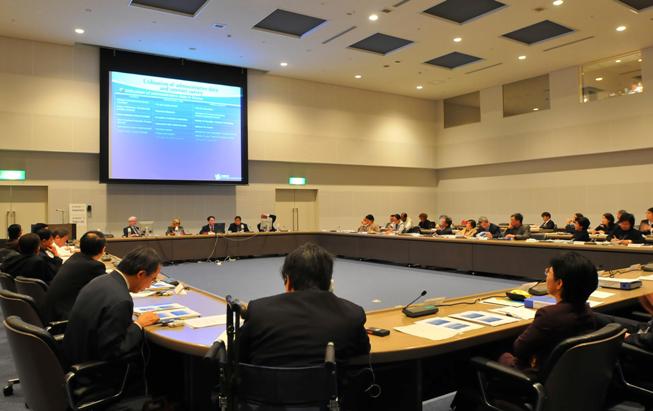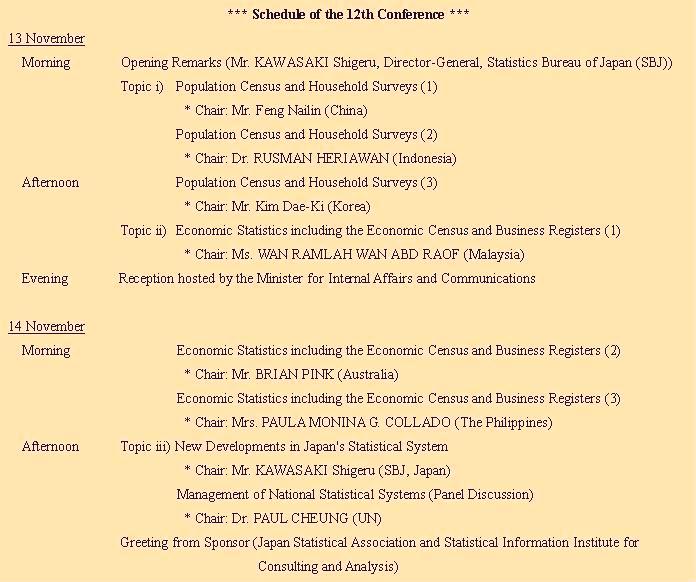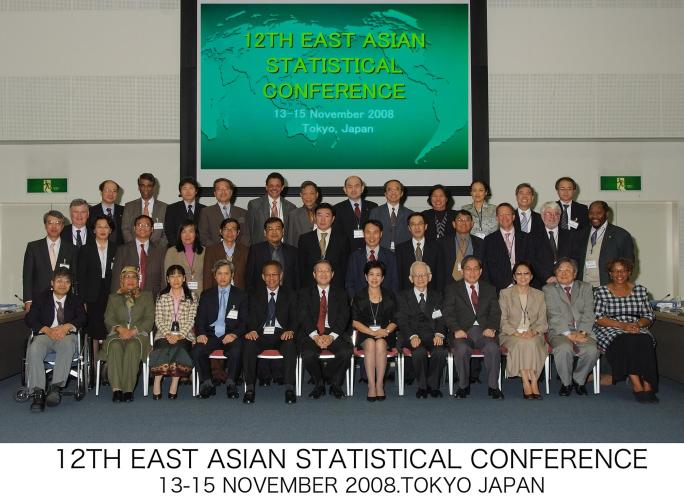Main contents start here
News Bulletin
NEWS HIGHLIGHTS
12th East Asian Statistical Conference held in Tokyo
The 12th East Asian Statistical Conference was held from 13 to 15 November 2008 at the United Nations University in Tokyo, Japan. This conference was initiated in 1980 to promote the development of official statistics in the region through the informal sharing of experiences and ideas among the heads of national statistical offices, and is held every two to three years.
Chief statisticians and representatives from the following countries and international organizations attended the conference: Australia, Cambodia, China, Hong Kong (China), Indonesia, Japan, Korea, Laos, Malaysia, Mongolia, Myanmar, New Zealand, the Philippines, Thailand, Vietnam, UNSD, ESCAP and SIAP. This time South Africa and UNESCO also joined as observers.

Under the overall theme of challenges for the future, based on each office's experience and the current status of official statistics, the following three topics were discussed:
i) Population Census and Household Surveys
ii) Economic Statistics including the Economic Census and Business Registers
iii) Management of National Statistical Systems i) Population Census and Household Surveys
This session covered the new methodologies and improvements in data collection for more accurate enumeration, promoting the wider and more advanced use of statistics from the census and the surveys, building on the census as part of a broader program of demographic statistics, including intercensal population estimates and population projections, and the role of the census as a potential framework for a household survey program.
ii) Economic Statistics including the Economic Census and Business Registers
This session covered the use of comprehensive censuses versus a set of surveys in providing the key national economic statistics, the use of administrative data for supplementing or replacing the census or surveys, the possibility of using the administrative data, including tax records, employment insurance records and barriers to be overcome, and harmonization with international statistical standards.
iii) Management of National Statistical Systems (Panel Discussion)
The main issues discussed in this session were new developments regarding the framework of the national statistical system, including priority setting and resource allocation, the engagement of a wide range of stakeholders, including key users and respondents, and incorporating international perspectives in the management of the national statistical system.
In regard to the Population Census, each presenter outlined the plan of the 2010-round Population Census, focusing on measures for gaining better support and cooperation in the census and improving data quality. Expectations were expressed for broader use of IT, such as internet and OMR/OCR, although there are challenges in maintaining data security and quality.
In the session on economic statistics, some countries presented the plans for the Economic Census, while other countries presented the system of economic surveys based on the business register. Data collection for economic statistics of each country depends on the organizational and administrative framework, but a trend to utilize administrative records for establishing the survey frames is observed.
Finally, in the panel discussion, panelists presented the recent developments of their respective national statistical system, referring to a new legislation, reorganization, or a new frame work. Discussions dealt with various management issues such as maintaining trust in official statistics, relation ship with stakeholders, coordinating mechanisms within the government, and human resource development. Importance of leadership at the top management backed by the solid legal basis was emphasized.
In conclusion, the conference recognized the necessity of continued cooperation among countries in the region to exchange experience for improving statistics.
Social Programs
As part of the conference, a reception was hosted by the Minister for Internal Affairs and Communications on 13 November and by the Director-General of SBJ on 14 November. On 15 November, the participants went on a day trip around Kamakura, taking an opportunity to get a taste of the history and culture of Japan.


